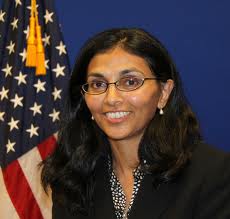 Washington – International patience could wear thin with Sri Lanka unless it takes action to address allegations of atrocities during the island nation’s civil war, the top U.S. diplomat for South Asia said Tuesday.
Washington – International patience could wear thin with Sri Lanka unless it takes action to address allegations of atrocities during the island nation’s civil war, the top U.S. diplomat for South Asia said Tuesday.
Assistant Secretary of State Nisha Biswal stopped short of endorsing a deadline set last month by British Prime Minister David Cameron, who said he would call for a U.N.-backed inquiry into allegations of war crimes unless there was progress on postwar reconciliation by March.
A U.N. report has suggested Sri Lanka’s military may have killed up to 40,000 civilians in the final months of the war in 2009 as it crushed ethnic Tamil rebels, who are also accused of atrocities.
Biswal urged Sri Lanka to take concrete steps on its own, particularly on issues of accountability.
“We would like to see Sri Lanka address these issues through its own processes, and we hope that can in fact be the case,” Biswal told reporters, adding that recommendations of a Sri Lankan-government appointed reconciliation commission pointed the way forward.
She said without real progress the patience of the international community “will start to wear thin.”
The government of President Mahinda Rajapaksa has so far ignored calls for a thorough local inquiry into war abuses and says it will not allow any international probe. He denies allegations of abuses by the army.
Since the Tamil Tigers’ 27-year battle for an ethnic homeland ended, Rajapaksa’s grip on power has tightened. Recent reports of media harassment and rights abuses have also raised alarms, although a convincing victory for the main ethnic Tamil party in provincial elections in northern Sri Lanka in September were seen as a small step toward devolution of power.
Biswal, portfolio covers South and Central Asia, also voiced concern Friday about political violence in Bangladesh, where street clashes between rival factions have killed about 40 people and wounded hundreds in the past month.
The opposition is resisting government plans to hold a general election on Jan. 5 unless Prime Minister Sheikh Hasina allows a neutral caretaker administration to oversee the polls.
Biswal, who recently visited Bangladesh, called for the major political parties to come together and work out a compromise “that will allow for elections to take place that the people of Bangladesh have confidence in and feel are credible.”
She said failure to achieve a peaceful political transition poses the greatest obstacle to Bangladesh continuing its progress of the past decade in areas such as reducing child and maternal mortality and improving food security.
Analysts fear the political chaos could exacerbate the economic woes of the country of 160 million people and lead to radicalization in a strategic pocket of South Asia.
—————
Times of India, July 20, 2013
Desai Biswal, who is a graduate of the University of Virginia, began her professional career in Washington DC with the American Red Cross in the mid-90s before she joined USAID in her first stint. As a Hill staffer with the US House of Representatives International Relations Committee from 1999 to 2002, she worked extensively with diplomats from the region before doing another stint with the NGO InterAction. From 2005 to 2010, she was the Majority Clerk for the State Department and Foreign Operations Subcommittee on the Committee on Appropriations in the US, a crucial position close to the purse strings of American foreign aid.
Her appointment was met with much delight in the Indian-American community with great approval voiced over social media. Although there have been several other Indian-Americans at the assistant secretary level ( Bobby Jindal, Richard Varma, Karan Bhatia, Suresh Kumar among them), this is the first time an Indian-American is heading the South Asia bureau, a new milestone for the community —
Previous assistant secretaries of the South Asia bureau from the time it was formed in 1991 are Robin Raphel, Karl Inderfurth, Christina Rocca, Richard Boucher, and Robert Blake – in that order.